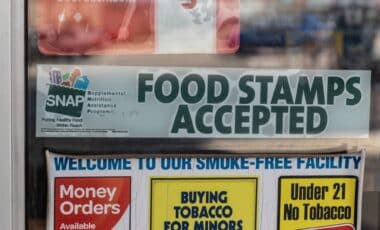The Conservative Party, led by Prime Minister Rishi Sunak, recently announced its intention to maintain the cap on the two-child benefit on Universal Credit should it win the next election.
This stance has provoked conflict with many not-for-profit organisations, which are advocating the removal of the two-child cap in the face of rising levels of child poverty in the UK.
Clarifying the Two-Child Benefit Cap
The two-child benefit cap is a government policy that limits financial support for extra children in large families who are on Universal Credit.
Prime Minister Sunak reaffirmed his party’s commitment to maintaining the ceiling on allowances for two children. His point is based on the fact that pay rises are not given to workers and families who have more children, and therefore anyone relying on public assistance should also bear this in mind.
The key objective of this policy, as expressed by Prime Minister Sunak, is to reduce dependency on benefits and to reduce related public expenditure.
According to the Institute for Fiscal Studies, there has recently been a significant surge in the number of citizens claiming health benefits since the start of the pandemic, with a tenth of the population currently receiving some form of government assistance.
Mr Sunak expressed his concern over the fact that providing ongoing public assistance without encouraging self-reliance does little to help those who are trapped in long-term welfare programmes.
His proposed reforms are designed to give people a ‘helping hand’ rather than endless ‘handouts’, enabling them to support themselves through employment where possible.
Criticism of the Policy
Opponents such as advocacy groups have criticised what they see as the hostile rhetoric and blatant targeting of disabled people in Sunak’s welfare reform strategy.
In response to Sunak’s affirmation of maintaining the two-child cap, Alison Garnham, chief executive of the Child Poverty Action Group, pointed out that child poverty has never been higher.
“At a time when child poverty is at an all-time high, the Prime Minister has made increasing financial hardship for children his policy priority. Struggling families need support after the challenges of Covid-19 and the rising cost of living, not new penalties. Restricting support to two children unfairly punishes those with larger families.” Alison Garnham.
Official statistics published earlier in March reveal that child poverty levels hit an all-time high last year, with more than 4.33 million children living in households on relatively low incomes.
The combined weekly income threshold for this designation for a couple with two children was less than £530 after housing costs. Furthermore, one in four children live in absolute poverty, defined by household incomes below 60% of the 2010/11 inflation adjusted median reference income, which equates to less than £485 per week for a couple with two children after housing costs.
| Category | Number |
|---|---|
| Children in relative low-income households | 4.33 million |
| Children in absolute poverty | 25% of children |
Last week witnessed the start of a campaign to reduce child poverty rates by 30% by 2030. This initiative is backed by renowned human rights lawyer Cherie Blair and former Children’s Commissioner Anne Longfield.
Among the key measures advocated to achieve this target is the abolition of the two-child benefit cap, a sentiment shared by the current Children’s Commissioner, Dame Rachel de Souza.









